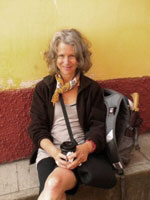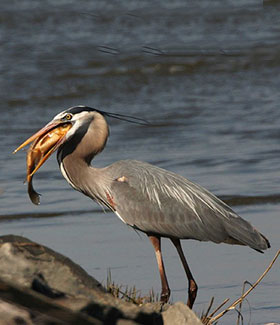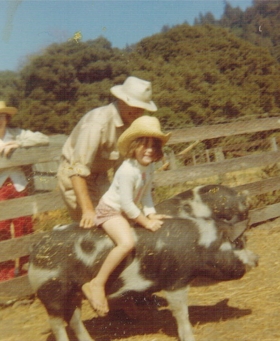Poems by Dion O'Reilly
Archives: by Issue | by Author Name

Band-tailed Pigeon
by Dion O'Reilly
From Canary Summer 2020
Dion lives in the Soquel Creek watershed on a stream-cut terrace covered with a thin mantle of alluvium on a ten-acre triangular plot between Soquel Creek and its tributary, Love Creek.

I stand in the searing heat
in my beat-up robe,
ready to fill the depleted feeders,
with bags of mealworm, millet,
black-oil seeds, and suet—
when I see it— big as a boot,
wings beating like a raptor—
as it drops to my dried-out garden,
scattering the chickadees and bushtits,
sending up a pulse of quail.
White crescent on her hind-neck
and a block of pink-checkered shine,
she turns her nape to the sun, shows
her dove-gray chest, palest rose
like dusty silk.
So like a passenger pigeon,
for a minute I think Miracle!
A Lazarus bird has returned.
Sixty years living here, I’ve never
seen this city-hater hazard flight
out of the buckeye poison and tick trees
where they gather and thrum,
weave sticks nesting single eggs,
the yolks scavenged by jays,
their hatchlings, murdered and switched
with changeling cowbirds.
Look what it’s come to—
kids grown, my father dead,
a mother too old to hate,
two husbands gone, memories
of a lover slivered in my gut
like shards I can’t work out.
Waiting for another clumsy visitor
from a place I thought was empty—
cousin to a glowing steel-grey ghost.
So fearful and so hungry.
© Dion O'Reilly
Dispatch from the West
by Dion O'Reilly
From Canary Summer 2023

It’s fire time again.
So far so good.
Fog in the mornings
Erases the trees.
Shafts of sunlight
Break up the mist,
All of it, the same.
All of it, waiting.
Nothing for my diary.
Just records broken
Far to the north—
A heat dome like a dome
Of silence, but no one’s
Getting smart.
I admit it, I’m terrified,
Terrified of the hungry air
Taking back the slugs,
Earth and sky making
God-love as my house collapses.
I stare out the window, a black cat
Likes my meadow, sits
On the sidelines. Watches
The quail tilt their nervous hats,
Whirl to the bosky creek.
Nothing’s forgiven. Nothing’s forgotten.
Not last winter’s rain, too soft
To snuff the smoldering roots.
Not the roll cloud’s belly,
Pricking snags into flame.
For now, let’s praise
The cold Pacific.
Still cold. Oh Lord, still cold.
It lays its mist hand on me.
Says Quiet. Quiet!
Stop it. Be still.
First published in Topical.
© Dion O'Reilly
Hunger Moon
February 9, 2020
by Dion O'Reilly

watches us fast while the world freezes,
while game is thin, and there’s nothing
to eat in the lingering winter
but a fatless rabbit and a dirty root.
Storm Moon, Snow Moon we say—
but this year, sun for weeks. Dry wind
downs a power line, sets a pine ablaze,
no rain, no cloak of morning frost,
no meadow grass bent beneath a crystal sheet.
But isn’t this a hunger? A desire for winter
so deep, my bones feel like dust, my gut
hollow, waiting for the rhythm of rainfall
swept from the windshield as I drive downtown
to buy Picuda oil, shade coffee, Chilean grapes.
Hunger Moon, I want it all—the tap on the flue,
the wood stove fueled by a wet-fallen oak,
the thrill moment of takeoff,
droplets on my window pushed back by a great force.
Even in summer, when the garden is a reckless mess
of cress and fat-bottom squash—
Hunger Moon, you follow me.
First published in Chautauqua.
© Dion O'Reilly
Musth
by Dion O'Reilly
From Canary Spring 2018

The word for when bull elephants are straight-up crazy
to smash, fuck and kill, their penises longer than
yardsticks, erect for months at a time, a stream of urine
dribbling a trail of stench, sludge of hormones
leaking from their temples and running into their mouths.
They tell the truth with trumpet, stomp, and stink. No
veneer
in the few wild islands of green that remain.
In zoos and on the streets of Burma, the spell lasts
only days because they’re chained, starved, held
in solitary. Weakening the body weakens
the frenzy. What else can be done? There’s no realm
vast enough for such delirium. I think of the rough
boys I grew up with, the ones who hunted and ate
squirrels, the flesh gamy and smelling of bay trees.
The barefoot trails my friends walked to the creek are gone,
and so are the steelhead, snagged on wormy hooks,
cooked in a blaze on the rocky floodplain.
Teddy Roosevelt said War is imperative upon honorable men,
hoping his sons returned with missing limbs.
Mohammed Ali, what would he have done without
his elegant power? Arjuna even. How to spread the holy
Word whispered to him by Krishna, if not by rendering
it in blood. How can the male sex give it up? Their smooth ivory
flashing in the savannah sun, the gore and puncture,
the strong semen sending exactly who they are
into this diminishing world.
© Dion O'Reilly
Plenty
by Dion O'Reilly
From Canary Summer 2023

August, the last of the apricots
haunts the trees. Their furred skins, split,
rotten and dangerous, crawling
with stingers on the unseen
side of the globes.
Above me, buzzards tilt in the heat.
Do they miss the condors?
The stiff keratin of the bigger beak
to splay a corpse’s flanks, break it
for a weaker brother.
I heard we once crept
behind hyenas, cracked
the bones of their leavings,
squatted and sucked the soft insides.
So many ghosts shimmer
the sky, shiver the leaves—
all the helpmates, swarms
of the world, whispering,
Let me feed my hunger first—
then you.
First published in Salamander.
© Dion O'Reilly
Rivervale
by Dion O'Reilly
From Canary Fall 2017
We slammed doors. We set out shoeless on trails of powdery sand,
turned a corner to the river, smelled pockets of cool air rank
with black mud. Maple trees leaned in, dropped leaves that rested
like bruised hands on the skin of the water, then floated away
around the high rocks at the bend. None of our mother’s bitched-out
tasks, no sudden hands of brothers slapped away. No pimped-out
sisters or fatherless boys. No pirate-eyed stepfathers drunk
in La-Z-Boys. Gone was the stench of spilled beer and rat turds.
We learned downstream. We learned leaving. We learned someday.
Herons lifted their great bodies from the sandy streambed, shining
fish caught in their tapered beaks and the agony
twisting in the air made sense. We looked to the world
beneath the clear surface with its teeming minnows, we pushed
shin-deep through the creek, crawdads hiding, black
pincers pointing out. We snatched living food from the river—
steelhead and trout. We drank the water.

© Dion O'Reilly
Talisman
based on consumer research conducted in Saigon
by the World Wildlife Fund.
by Dion O'Reilly
From Canary Fall 2023
The rhino horn razored into peels, beaten to a powder,
a tea brewed, a man sipping it for a night of pleasure,
or mixed with lime and spring water
for acne, crows’ feet, perhaps a tonic to sweep the sludge from a gallbladder—
That’s how I imagined it—the animal, shot, and while he struggled,
the spike cut with a power saw, wrapped in wax paper,
maybe bubble wrap, maybe thrown naked into a Range Rover,
carried across the bumpy savannah with more
of its kind on a good day for starving poachers,
then loaded into boats and taken to a city, where
it ends up in the backseat of a car—
A Tesla, maybe, because people who buy the horn
are health conscious and wealthy, with strong desires
to reaffirm their social status, buy gifts for
an unreachable lover, a would-be boss, or a son’s teacher
because the horn possesses enchantment—
it makes people like you, strengthens
the silky bonds among peers, so when one
receives such a present—well, they feel properly admired. Then
there are those who store it as talisman—
a piece of legendary head, a skewer to impale a lion,
flip it into African dust— more powerful than
a blue pill, a statue of Ganesh, a pair of petrochemical vegan
shoes. Better than the biker jacket I bought, fragrant
of leather, stripped
from the pink-fatted bodies of free-range cows.

First published: Agents of Change: Art & Poetry Project
© Dion O'Reilly
White Hawk
by Dion O'Reilly

The mourning doves cooed
their question—Where? Where?
but today, silence.
I filled the feeders
just after dawn, saw the patch
of fluffy down
on the grass below.
One wing feather with a black dot,
told me who died.
Probably a hawk—
my favorite white one,
the leucistic one—
plunged from the sky,
snatched up the dove
settled on the pine,
stood, gripping the blood-
pink neck, and shrieked
a call echoing
down the long valley.
That piebald raptor—
the one I’ve watched
for years, proud that she
chose to live above my field,
as if she were mine,
a totem, my emblem of grace,
the one who snatches me
out of my thoughts,
stuns me on mornings
when I wake, dull, frightened
by my own emptiness,
how sharp and thin
the edges I balance on.
I hear her
shrill and alone,
drifting on the warm thermals
like the outstretched palm of a ghost.
© Dion O'Reilly
Why Did I Call my Pig?
by Dion O'Reilly
From Canary Fall 2020

I watched my mother call her,
I watched my sister too.
My father chased her.
They tried to round her up,
but my piebald oinker was quick,
her squeals greasing the air.
She knew the jig was up,
ran to the farthest corner, down
by the creek and the steep ravine,
hid in the shadows under oak trees,
rooting prickled leaves and acorns
with her wet ringed snout.
My huge baby, companion
on aimless teenage days
when I balanced on the fencepost, listening
to her belly-deep rumble,
scratched with a stick her itchy,
thick-skinned back.
It wasn’t for the sausage or ham,
the pork chops, or the slab kind
of bacon you couldn’t find in stores.
The butcher with a rifle,
stood impatient by his Chevy truck
its hook and chain ready
to haul the limp sow up,
to scrape the skin and slice the stomach
in a thin red line, the bowels spilling
glazy as moonstones.
Forgive me. To show off my small power,
I called her— the one she loved—
and she came running.
Previously published in the author's collection Ghost Dogs.
© Dion O'Reilly
Yellow
by Dion O'Reilly

It’s February, and the acacia
is blooming. Not wet,
though winter’s well along,
and the flowers by now
should be cold and sodden.
No matter. The air is helpless,
punch-drunk with pollen.
I know what’s next—
rooty mustard. Fields of it
mixed with the weightless
mouths of sour grass
showing their throats
as they shift on listless stems.
Yellow’s the first color of spring.
Hope yellow. Sick yellow.
Kitchen yellow. Pollen-petaled heart
of the columbine yellow, she-lost-
her-mind-and-ran-away-with-the-
pearl-handled-kitchen-knives yellow.
Head home to California
on the Gray Rabbit bus line,
from Seattle to San Francisco,
seats stripped-out, hippies
on dirty mattresses,
spooning and massaging
above the hum of the drivetrain.
Stop at Crescent City, stand
on a ridge, above a full-bloom meadow.
All that yellow
feeding my brain after nothing
but pine and pewter-grey.
I’m home. Thirty years now,
the rain behind me,
but I’m calling for it
down from the north
to scrub the thick air,
dampen the dried loam.
I’m too old to climb
the silver-skinned acacias,
botched with notches of crumbly black,
to sit thirty-feet-up
and scratch the bark’s thin skin,
smell the whiskey-wood stink,
see the hard green beneath,
smooth as muscle on an athlete’s arms.
To bower myself, safe
between limb and trunk
like I did when I was six
thinking nothing could touch me.
Not strange weather,
not whatever way the world ends.
Originally appeared in the author’s collection Ghost Dogs
© Dion O'Reilly